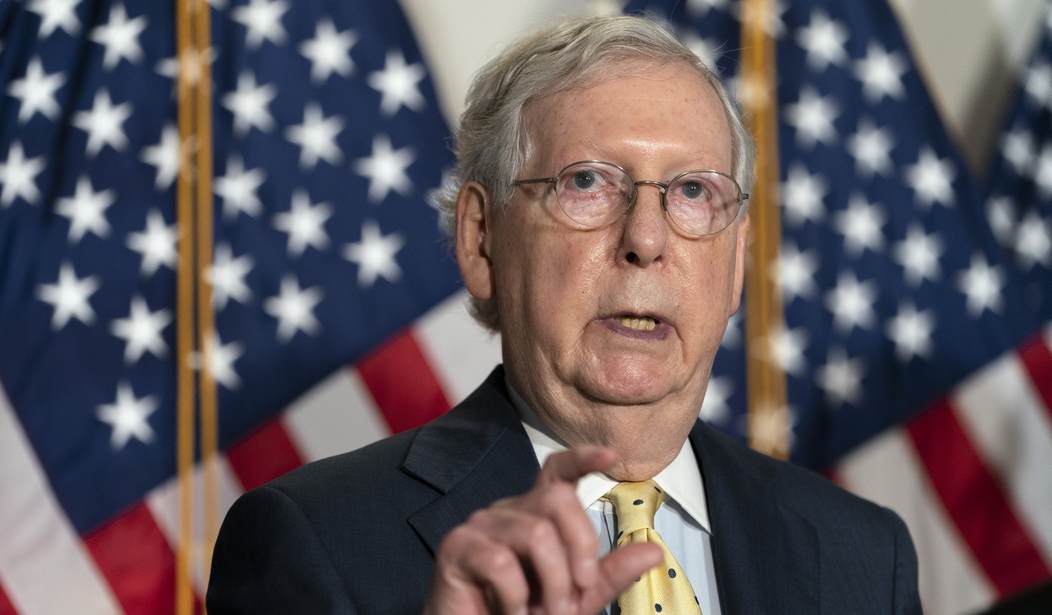On Monday, Senate Minority Leader Mitch McConnell said that if he becomes majority leader again in 2022 he will block Joe Biden from filling a Supreme Court vacancy if one occurs in 2024.
“Well, I think in the middle of a presidential election, if you have a Senate of the opposite party of the president, you have to go back to the 1880s to find the last time a vacancy was filled. So I think it’s highly unlikely,” McConnell told radio host Hugh Hewitt when asked about the possibility.
Following the unexpected death of Justice Antonin Scalia in February 2016, Barack Obama nominated liberal judge Merrick Garland to fill the vacancy, but McConnell, then the Senate majority leader, cited the “Biden Rule” and refused to hold any hearings for Garland. Democrats were outraged, but ultimately precedent, and Joe Biden, gave McConnell plenty of cover.
Back in June 1992, then-Senator Joe Biden gave a speech to argue that should a Supreme Court vacancy occur that year, a successor shouldn’t be nominated or voted on until after the presidential election that November. “[I]t is my view that if a Supreme Court justice resigns tomorrow, or within the next several weeks, or resigns at the end of the summer, President [George H.W.] Bush should consider following the practice of a majority of his predecessors and not — and not — name a nominee until after the November election is completed,” Biden said. A vacancy in 1992 never happened, but if it had, you can bet that if George H.W. Bush had attempted to fill a vacancy, Senate Democrats, led by Joe Biden, would not have held hearings for that nominee, and he would have considered such a move established precedent.
Related: McConnell Asking GOP Senators to Vote Down 1/6 Commission Bill as a ‘Personal Favor’
Democrats tried to flip the script in 2020 after President Trump nominated Amy Coney Barrett to the Supreme Court following the death of Ruth Bader Ginsburg. They argued that presidents had made Supreme Court nominations during election years in the past, and those nominees were confirmed. This is true. Here’s an updated list of those instances:
- In 1912, William Taft nominated Mahlon Pitney to the Supreme Court. He was confirmed by the Senate five days later.
- In 1916, Woodrow Wilson had two election-year nominations to the Supreme Court, both of whom were confirmed.
- In 1932, Herbert Hoover nominated Benjamin Cardozo to the Supreme Court. He was unanimously confirmed just over a month later.
- In 1940, Franklin Delano Roosevelt nominated Frank Murphy to the Supreme Court. He was confirmed by a voice vote.
- In 1987, Ronald Reagan nominated Anthony Kennedy to the Supreme Court. He was confirmed in February 1988.
- In 2020, Donald Trump nominated Amy Coney Barrett to the Supreme Court. She was confirmed a month later.
Here’s the thing: In all of these cases, except for Ronald Reagan, the president’s party had a majority in the Senate. So, should a vacancy occur during the 2024 presidential election season, McConnell would be adhering to established precedent and the Biden Rule, should he become Senate Majority Leader after the 2022 elections.
While Trump and many of his supporters may not hold McConnell in high regard, McConnell saved us in 2016 from having a liberal justice replace Antonin Scalia, and his partnership with President Trump transformed the judiciary in a way that will last a generation. Getting him back as Majority Leader should be the top priority of Republican voters in 2022.










Join the conversation as a VIP Member